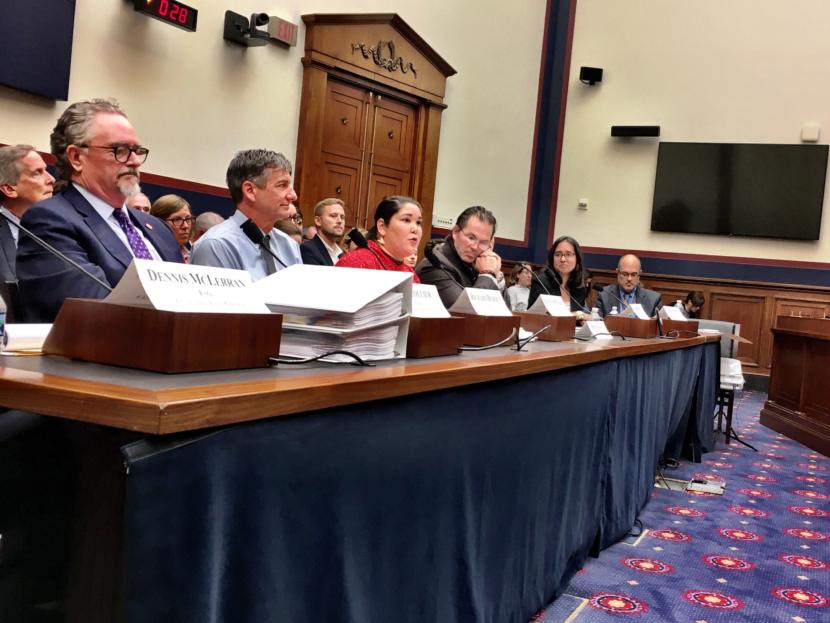
Publicly, Pebble CEO Tom Collier always radiates confidence about the proposed mine and about the viability of the company, even when partner after partner has backed out.
“If you believe it’s not viable, let’s all go home,” Collier scoffed at a congressional hearing last year. “But the project is financially viable. We’ve invested almost $1 billion in this project to get it where it is now. We’re going to be able to build it, and it’s going to make money as we go forward.”
But in a July 17 email to the governor’s office, Collier struck a less confident note, pleading for help and suggesting the company’s “survival” was at stake.
That’s one of the episodes revealed in documents from the governor’s office, obtained through a public records request. The records are a peek behind the scenes at one Alaska’s most controversial projects. They show how Pebble leaned on Gov. Mike Dunleavy to help the company woo an investor. And they show that a letter from mine opponents packed a punch.
Pebble has applied for a federal wetlands permit, and a ruling is expected this fall. If the permit is granted, Pebble would need state permits. And it’s clear from its financial reports, Pebble is going to need a lot more money to keep going.
Back in July, Pebble was pinning its hopes on a Canadian firm called Wheaton Precious Metals for a substantial investment. Wheaton executives would visit Alaska later that month, and Collier wanted to show them that his project had the governor’s support. The Pebble CEO planned a dinner for the potential investors at his Anchorage home, prepared by a private chef. A senior advisor to Dunleavy was coming. But Collier felt it wasn’t enough.
Collier emailed Dunleavy advisor Brett Huber, asking that the governor change his out-of-state travel plans. The governor had to meet the Wheaton delegation, Collier wrote. A phone call wouldn’t do it.
“I would not make this request unless it I thought it was absolutely, critically essential,” Collier said in his July 17 email. “This currently is our best option for survival.”
Taryn Kiekow Heimer, an attorney with the Natural Resources Defense Council, saw a copy of the Pebble emails late last year. (CNN obtained them from the governor’s office first, and the network let her read them.) Heimer says she was struck by Pebble’s tone, and how needy Collier sounded.
“It was really interesting to see him admit it,” Heimer said. “Seeing that come through differently, you know, secretly to the governor, really validated what we see when they provide quarterly statements of their financials. What’s really evident is that they desperately need money.”
Pebble declined an interview request for this story. Spokesman Mike Heatwole says the company is on firmer financial footing than it was in July, after raising $20 million by selling stock.
Heimer says she was amazed to see how Pebble pressed the governor for help attracting investment dollars from Wheaton.
“Asking the governor to shill for them, right? It’s extraordinary,” Heimer said. “The governor is giving a sales pitch, on behalf of a foreign mining corporation.”
The governor’s office declined an interview request and refused to say whether Dunleavy complied with Pebble’s request to meet the Wheaton team. But Dunleavy did write a letter to Wheaton encouraging the company to invest, and the emails reveal the letter was written almost entirely by Pebble.
The records from the governor’s office also show what happened right after the Wheaton team visited Alaska. Heimer’s group and other mine opponents wrote Wheaton a 12-page letter, basically warning that if they invest in Pebble, they’ll face never-ending opposition.
The message landed like a bomb.
Within 10 minutes of receiving it, Wheaton CEO Randy Smallwood sent a terse email to the chief executive of Pebble’s parent company.
“Wow. Things don’t stay very secret around our visit,” Smallwood wrote. “Pretty sure a similar package will have been delivered to our directors. Not good.”
Actually, Heimer says, mine opponents got lucky. They’d heard a mining investment company might be interested in Pebble, so they sent letters to about half a dozen firms, including Wheaton
“We papered a bunch of them,” she said. “I never heard back from anybody.”
She did not send the letter to Wheaton’s board of directors, as Smallwood feared. But now Heimer says she knows what to do if she sends a similar letter in the future.
“Hearing what Mr. Smallwood said about that, I will absolutely be sending it to every single senior executive and board director.”
Wheaton has not invested in Pebble and the company isn’t saying if it’s still considering it.
Reporter Nat Herz contributed to this story.
